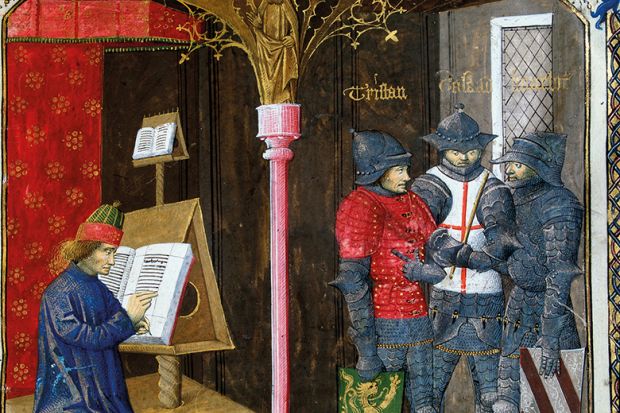The humble book index has a surprisingly dramatic history, including cases of “saving heretics from the stake and keeping politicians from high office”.
So says Dennis Duncan, lecturer in English at UCL, whose new monograph, Index, A History of the: A Bookish Adventure (Allen Lane) makes clear how the evolution of indexes has been tightly linked to the development of universities.
“Monastic reading is for one’s own spiritual experience,” Dr Duncan explained. “It’s a form of meditation but not a type of what we now call public engagement.” It was only when people started delving deeply into the meaning of texts in early university classrooms that they needed to “speed up the ways in which we read books and find our way around them”. Bishop Grosseteste University in Lincoln still bears the name of the man who created what Dr Duncan describes as the nearest 13th-century equivalent of a search engine.
Today, too, he told Times Higher Education, students and even many scholars “churn through a dozen books in a day, using the index”. It was crucial for academic authors, therefore, to make things easy for them by “treating the index as an important part of our own books” – probably by getting a specialist indexer with relevant subject knowledge to create it.
Technology-driven alternatives to human-led indexing had failed to live up to early hopes, said Dr Duncan, who recalled an unhappy experience “where the index was provided by the publisher but generated by indexing software. Though the whole book was about translation, the index had just a single page reference under that heading. Everything that had a capital letter turned up in the index, including common nouns which just happened to start a sentence.” Human indexers were still far more effective at “making associations based on synonyms”, such as working out that “No 10 put out a statement” refers to the prime minister of the day and deducing from the context which prime minister the author had in mind.
So there was still plenty of room for competent professional indexers. But what about the long tradition that Dr Duncan explores in his book of people using indexes to make mischief and discredit political or scholarly rivals?
At the start of the 18th century, a polemicist called William King had a snobbish distaste for what we would now call “citizen science” and the way that the Philosophical Transactions of the Royal Society drew uncritically on amateur contributions. He therefore published his own selection of the most trivial, absurd and clumsily written examples, rubbing in his contempt with an index featuring entries such as “A China Ear-Picker”, “That Men can’t swallow when they’re dead” and “Dr Lister bit by a Porposs, and how his Finger fell sick thereupon”.
Horace Round’s Feudal England, published in 1895, challenges what it sees as the many errors of Edward Augustus Freeman, Regius professor of modern history at the University of Oxford. Though the criticisms are scattered throughout the text, it is in the index that Round really rubs it in, with subheadings under Freeman including “his ‘facts’”, “his bias”, “his pedantry”, “his supposed accuracy”, “his confused views” and “his special weakness”.
The most recent example cited in Index comes from a 1985 book by the historian Hugh Trevor-Roper, who did not enjoy his time as master of Peterhouse, Cambridge and therefore included the subheads “high-table conversation not very agreeable” and “main source of perverts” in the index entry for the college.
So would Dr Duncan like to see today’s academics also using indexes to settle scores?
“It’s a lost art,” he replied. “We do find academics putting jokes in their indexes, bits of surreal humour. As for the cut and thrust of academic jousting, I do know of one example of a medieval history book which had to be pulped in the past decade.” Though unable to give much further detail, he noted that the index in question featured both libel and obscenity.
His own book includes a full but fairly jokey index and, provided academics can remain within the law, he would like to see “a real comeback” for a bit more high spirits.
Register to continue
Why register?
- Registration is free and only takes a moment
- Once registered, you can read 3 articles a month
- Sign up for our newsletter
Subscribe
Or subscribe for unlimited access to:
- Unlimited access to news, views, insights & reviews
- Digital editions
- Digital access to THE’s university and college rankings analysis
Already registered or a current subscriber? Login




